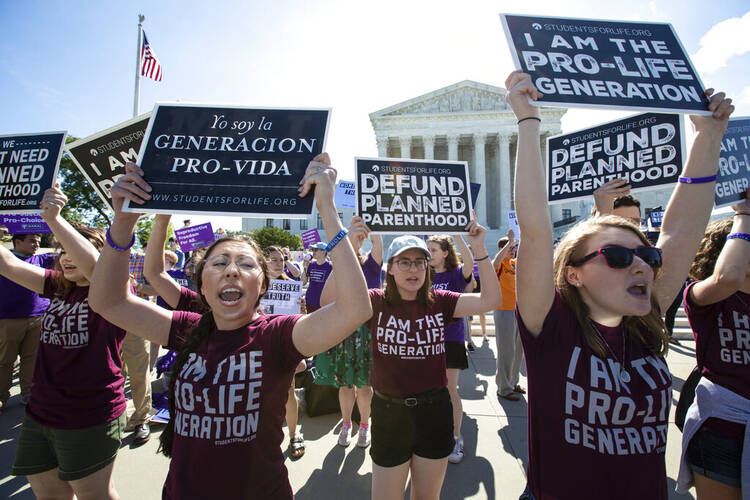Editor’s note: This article is part of The Conversation with America Media, offering diverse perspectives on important and contested issues in the life of the church and society. Read another view on Texas’ abortion law here.
With the passage of its new “heartbeat” law, Texas has a tremendous opportunity to show that our society can provide women with support, compassion and alternatives to abortion. We must elevate the way we treat pregnant women and preborn life.
Social media has been aflame with angry screeds about bodily autonomy, arguing that the law assaults women’s rights and harms minority communities.A tweet from a Planned Parenthood executive called the ban “insurmountable for far too many Texans,” and others on social media offered to fund travel to other states for abortion.
With the passage of its new “heartbeat” law, Texas has a tremendous opportunity to show that our society can provide women with support, compassion and alternatives to abortion.
We should not get caught up in the rhetoric; we should look at the reality. Texas abortion providers have already indicated that they are abiding by the law, no longer performing abortions once a heartbeat is detected. This means there are pregnant women in need of immediate support. Abortion providers, abortion supporters, pregnancy care clinics and pro-life activists must work together to address those needs.
According to the Texas Department of Health and Human Services, 53,949 abortions were performed in Texas in 2020. A majority of women affected by abortion are poor and almost three-fourths of Texans seeking abortions are women of color.
While Texas already has a vast network of pregnancy support centers, a more robust infrastructure is needed to meet the current need. The Texas Senate recently passed the Every Mother Matters Act (EMMA), which would connect expecting mothers with various local resources. This kind of legislation must accompany restrictions on abortion. The Texas House should pass the Every Mother Matters Act when Gov. Greg Abbott calls an expected third special session to address redistricting.
An unlikely partner to address abortion alternatives can and should be a key Democratic ally and the largest abortion provider in the United States: Planned Parenthood.
But the Texas Legislature should not stop there. There is a whole host of legislation they should pass to complement their heartbeat law and to provide women who might normally choose or be coerced into abortions with resources and support throughout their parenting lives. Immediate steps the legislature can take include expanding Texas’ Alternatives to Abortion program, expanding Medicaid, providing adequate accommodations in the workplace for pregnant women, expanding access to paid leave and requiring equal pay for equal work. They should also expand access to perinatal hospice for women whose preborn children receive a terminal diagnosis. These examples are only the beginning of the horizons we must chase to support pregnant and parenting women.
An unlikely partner to address abortion alternatives can and should be a key Democratic ally and the largest abortion provider in the United States: Planned Parenthood.
Planned Parenthood’s 2019-2020 Annual Report states that their network performed 354,871 abortions nationwide during the previous fiscal year. The same report states that it provided only 8,626 prenatal services. In other words, Planned Parenthood’s support of pregnant women is overwhelmed by its termination of pregnancies.
If Planned Parenthood does not trust crisis pregnancy centers, the abortion Goliath should beat the centers at their own game.
Some have speculated that Texas’s heartbeat law will cause the closure of many abortion clinics in Texas. This need not be the case. Rather, clinics whose revenue streams have relied on the violation of preborn human rights can reform their business model. I challenge Planned Parenthood of Texas to transition its clinics from providing abortion to providing life-affirming care for both mothers and preborn children. I call on Planned Parenthood of Texas to perform more prenatal services in the coming year than all other procedures provided by the network combined.
Planned Parenthood has been critical of crisis pregnancy centers, calling them “fake” and claiming the centers are trying to “shame people out of choosing abortion.” In fact, most pregnancy centers provide clothing, diapers, parenting classes and other meaningful support. An increasing number now have medical staff offering prenatal and postnatal healthcare. If Planned Parenthood does not trust crisis pregnancy centers, the abortion Goliath should beat the centers at their own game. Planned Parenthood should provide women with real medical care, not the Band-Aid of abortion.
Texas’s heartbeat law gives abortion providers the chance to show that they genuinely care about women. Instead of funding travel for women to go to another state for an abortion, they need to step up and offer the real health care they claim to provide. Should Planned Parenthood and others in Texas close their doors, it may create an impression that abortion, not protecting women, is their primary goal.
The law also provides supporters of the ban an opportunity to show that we care about the children outside the womb as much as we care about the child inside the womb by passing legislation like the Every Mother Matters Act, paid maternity leave and other measures to support new mothers. Neither side should walk away from women in need simply because abortion will not be an option in Texas once a heartbeat is detected.
Civil rights leader Fannie Lou Hamer summed it up best: “I think these children have a right to live. And I think that these mothers have a right to support them in a decent way. We are dealing with human beings.”









